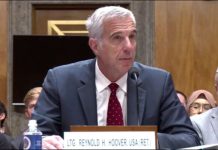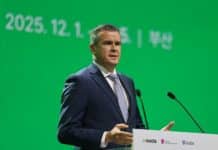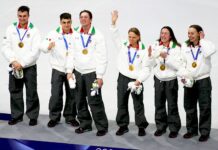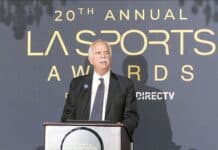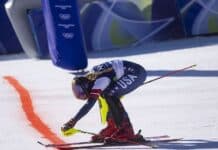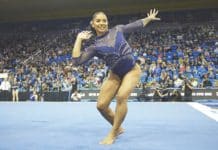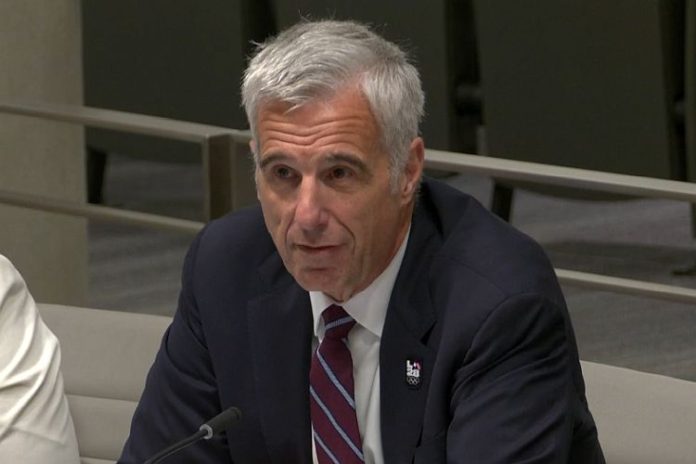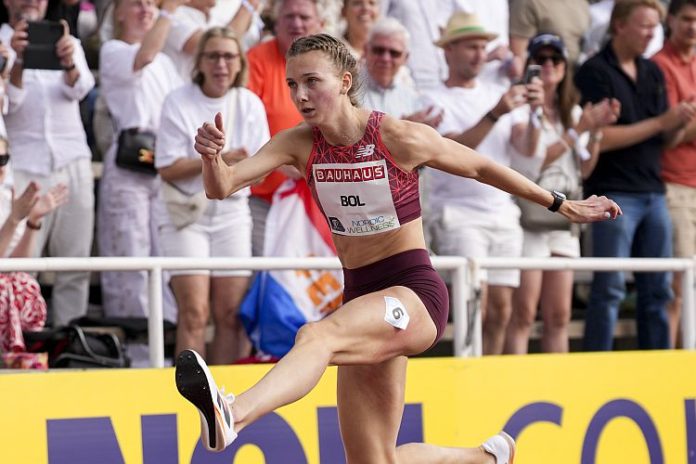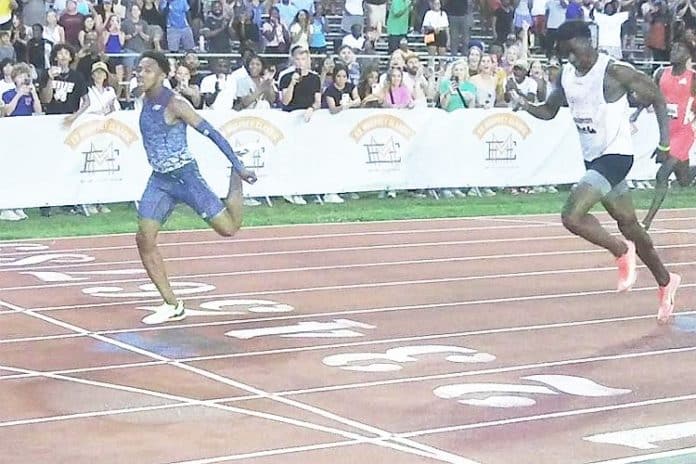★ The Sports Examiner: Chronicling the key competitive, economic and political forces shaping elite sport and the Olympic Movement.★
★ To get the daily Sports Examiner Recap by e-mail: sign up here! ★
≡ THREE YEARS TO GO ≡
The Games of the XXXIV Olympiad are scheduled to open on 14 July 2028, three years from now and the wheels of government are starting to turn, with more attention being paid to the event.
On 4 July, U.S. President Donald Trump signed H.R. 1, the “One Big Beautiful Bill Act,” which allocated $1.0 billion to the Federal Emergency Management Agency for use in security, planning and other costs related to the 2028 Olympic Games.
Last Thursday (10th), the new California Senate Special Committee on International Sporting Events: Olympics, Paralympics and World Cup Soccer, held its first hearing, on “California Goes for the Gold: Overview of the Challenges and Opportunities of the LA28 Olympic and Paralympic Games.”
The nearly-three-hour session, chaired by Sen. Ben Allen (D-Santa Monica), included four panelists, with a focus on what government is doing about the 2028 Games, as well as the LA28 organizing committee:
● City of Los Angeles: Paul Krekorian, Executive Director, Office of Major Events
● County of Los Angeles: Fesia Davenport, Chief Executive Officer
● Visit California: Ryan Becker, Senior Vice President of Communications & Strategy
● LA28: Reynold Hoover, Chief Executive Officer
Hoover, in his now-familiar, affable, low-key style, explained where he sees the organization of the event as this point after a year on the job. He gave a very thorough primer on the Games and the effort so far, starting with:
“As I look backwards over the last year, I can say without a doubt that your organizing committee in L.A. is strong and getting stronger every day … We’ve made significant progress.”
As the committee was brand new to the Olympic and Paralympic Games, Hoover emphasized the basics:
● “Let me just start out by saying the organizing committee is a nonprofit organization. We get no money from the Federal government. We ask no money from the State, and we don’t get local funding; all of our revenue and all of our operating costs – we have a $7.1 billion budget – comes from sponsorship, comes from [International Olympic Committee] flow-through money – money that comes from broadcasting – comes from licensing sales, merchandising sales and ticket sales.
“So when we talk about funding and things like that, it is not money that comes to us. So money that the State brings to the table or money that the Federal government [brings] to the table, does not come to us. It is for State and local and our partners who are actually part of the delivery, whether it’s at the County or at the State or at the City level.”
● “Part of my kind of my plebe [first] year, if you will, has been to go out and rebuild relationships in the community and to be and to be as transparent as I can. …
“We’ve met with the unions to talk about training opportunities and how we can train the workforce to prepare. we continue to work with the City and the County over procurement to how we make sure that we bring economic opportunities to small businesses, to micro businesses, so that the entire community lifts up. …
“It is my goal that people will look at LA28 as more than just an organizing committee, but as a civic organization that is really a part of the community that is trying to uplift our community as a whole, to uplift the state of California and the nation.”
● “We actually say it’s seven Super Bowls a day, simultaneously for 30 days, which is just unprecedented. This will be the largest Olympics ever and also the largest Paralympics ever, and the first time we’ve had Paralympics in Los Angeles.”
● “I mentioned our $7.1 billion budget that we are raising; we are well on our way. We just announced yesterday our eighth sponsorship, with Uber, who will be our our rideshare partner and our on-demand delivery partner as well.
“And the eight sponsors that we’ve announced this year outpaces all of what we did last year. We are well on track to hit our [target] numbers at $2 billion by the end of the year, just in sponsorship alone, so we feel very good about where we are on the revenue side of the business.
“In terms of ticket sales, we have about four seasons of Dodger Stadium to sell in terms of tickets, so it’s about maybe 13 million tickets to sell. and we will go out to public sale next summer.”
● “We will do a 50-state torch relay. It’s never been done before, and we believe that that torch relay is the thread that’s going to bind the nation to L.A. and California. And it’s a way that we are going to unify the world. And the world will see that we are L.A. strong and California is strong.”
Hoover also mentioned the 2017 economic impact study which projected an $18 billion total economic impact, $6 billion in labor income, $1.6 billion in Federal tax revenue and $700 million in state and local tax revenues. This is being updated now.
Hoover also shared a personal insight about taking his position, coming out of retirement after rising to the rank of Lt. General in the U.S. Army:
“There is no better way to capstone nearly 40 years in uniform than to come back and unite the world around sport at a time when we need it the most, and not only unite the world, but unite the nation around sport.
“There is nothing like it when you watch those Olympic and Paralympic athletes on the field of play, it gets in your heart. It really does. and we are so excited to bring that to California and to Los Angeles. there is no other place in the world that can host the Games of this size and this magnitude.”
He also talked for the first time publicly – in some detail – about government funding, which has been a sizable issue, not only about security, but also transportation and local readiness:
“There are four really lines of effort at the Federal level that we’re working with very closely with the Administration. On the security funding side, again, we don’t get any of that money. That all goes to state and local first responders.
“We continue to advocate with the Administration as well as on the Hill for 100% reimbursement to our state and local partners who are providing security services for the Games. We’re very pleased that in the President’s bill that $1 billion was allocated this year, in this most recent bill to help us with that initial funding requirements for security.
“On the transportation side, we work very closely with Caltrans, as well as L.A. Metro on our transportation requirements to support the Games. and we believe that transportation funding from the Federal government will be forthcoming at some point in time. But we continue to advocate for that.
“Visas and consular affairs and consular operations is top of mind for all of us. We’re very pleased that the Administration, even though they’ve put a travel ban out, that they have carved out specific exemptions for the Olympic and Paralympic Games, and we have a very good relationship with the Department of State, and both between us and the U.S. Olympic and Paralympic Committee, we’re working very closely to make sure that all of the athletes and all of the people that are supporting the Games and people that want to come and visit and visit L.A. and visit the region will have the opportunity to do that.
“And then finally, with telecommunications, we work closely with the [Federal Communications Commission] both on cyber but as well on spectrum management. So we’ll actually end up pulling about 250,000 miles of cable to put in our own network, that we will leave behind. And we’re asking the Federal government for some assistance, because that is a legacy project. at the State level.”
One of the themes of the session from the committee members was how people can get involved in the Games in their own communities, whether close to the venues, or far away. Hoover spoke about this also:
“The first is there are a number of opportunities for fan fests, and those are opportunities to have big screen TVs and all kinds of other things that gets the community engaged around the Olympics. And we can certainly provide additional help in trying to plan those and get those together.
“Our volunteer program. You know, when you went to Paris, the volunteers to me were the ones that made – besides the athletes and Paralympic athletes – the volunteers were the ones that made it. They were the first people you saw at the airport. They were on every street corner. They were at every metro stop. They were at every venue. …
“They were always happy. They came from all over the world. If they didn’t know the answer to a question, they would take you to the person that did. They needed 43,000 volunteers, and in Paris, they had over 300,000 applicants for volunteers from across the world. That spirit of volunteerism is just an amazing, powerful, uniting event, and we want to bring that to L.A.
“And so we are actually starting our volunteer program early. We will kick that off this summer, about 18 months ahead of schedule from what the IOC would be asking for, because we want that spirit of volunteerism and we believe that we can take that base of volunteers and turn that into a viable workforce, that we can then turn back to the community for, again, a lasting legacy economic benefit.
“And we’re really excited about that. The education program is training that we’ve been talking to some of the unions about, about how we can provide training opportunities today so that our volunteers and our workforce.
“By the way, we’ll probably need somewhere between 45,000 to 50,000 volunteers. Our own headquarters will grow to about 4,000, a little over 4,000 full-time employees, that those people will have skills and jobs that we can transfer to the communities.
“And so we’re working on ways to be able to do that. and then finally, I mentioned the torch relays. And I think that’s another opportunity in addition to just the 50-state Olympic torch relay, there will be a subset relay that we will also do for the Paralympic Games as well. And so there are tremendous opportunities across the board for your communities to get engaged.”
He said that the torch relay would likely start in April 2028 and run about 100 days, with a 14-day Paralympic relay.
Krekorian explained the role of the City of Los Angeles Major Events office, which has been quiet during the City’s tumultuous budget debate:
“Our function with regard to the Games is to coordinate all City efforts relating to preparation. We’re kind of the hub of the wheel. We have many departments, virtually all of the City departments who are doing work relating to the Games. so we’re the place where that all comes together and is coordinated, and it’s my job to make sure that it’s happening on schedule and effectively. Our goal, of course, is to make sure that we have the most successful Olympic and Paralympic Games that we possibly can have, but it’s also our responsibility to ensure fiscal oversight, both over the City’s own expenditures as well as the expenditures of the organizing committee.”
And he noted that L.A. will have its own volunteer program:
“[T]he city will probably need its own volunteer force of 15 to 20,000 people, Paris had 13,000. Their Metro system had another volunteer program. So when you take all that together and you have 75,000 people who raise their hands and say, ‘I want to do something good for my community.’”
Davenport spoke to L.A. County’s role in supporting the Games venues in its jurisdiction, and a critical role in support services, including security and public health. She also noted planning on use of 188 parks within the County, for fan festivals and in-community programming.
Becker talked at length about the tourism opportunities and challenges, and while not a sponsor of the organizing committee – he mentioned “$50 million” as the price – planning is ongoing with the FIFA World Cup coming in 2026 and the Games in 2028 for promotions – ads, influencers and other campaigns – for visitors to extend their stays beyond coming just to the events.
There were the inevitable questions about how LA28 was going to get free tickets into the hands of area resident so they everyone could experience the Games. Hoover noted that discussions have started on philanthropic efforts to create these kinds of possibilities. In Paris in 2024, the City of Paris itself bought tickets from the organizing committee for this purpose; that’s currently out of the question for the City of Los Angeles, County of Los Angeles and the State of California in the face of deep budget challenges.
Observed: This Senate committee has a long learning curve ahead of it, showcasing little knowledge of Los Angeles’ Olympic history, or who plays exactly what role. Look for more hearings in the future.
Hoover is emerging as an articulate, engaging spokesman for the organizing committee, but the comments of Senators indicated the enormity of another problem that LA28 – and the City and County of Los Angeles – are facing and will continue to face: meaningfully informing elected officials and staffs in the State Assembly, State Senate, state agencies, the 88 cities – mayors, city councils and staffs – inside Los Angeles County, and those in surrounding countries such as Ventura, Orange, San Diego, San Bernardino and Riverside.
A lack of information is bad enough, but mis-information and dis-information can create serious problems, and if they take hold, can be difficult to dislodge before the Games (or ever). A glaring past example was furnished during the hearing.
Sen. Susan Rubio (D-Los Angeles) said she watched “rocketman” Bill Suitor fly into the Los Angeles Memorial Coliseum at age 13 from her childhood home near L.A.’s Belmont High School during the opening ceremonies of the 1984 Olympic Games, but said she had no way to get into any of the Games events that followed. That was her only Olympic moment.
In fact, Rubio and members of her family could have attended any of the seven morning sessions of track & field at the nearby Coliseum during the Games … for $8 a ticket; there were at least 10,000 unsold tickets for every one of those sessions. But she, or her parents, either didn’t know, didn’t want to know, didn’t care to find out … or her parents didn’t want to go.
LA28 will have a significant challenge to penetrate Southern California households at a level deep enough to ensure that people know how they can attend the Games, get involved … or stay away from the Games if they want to. To succeed, that effort will have to start soon.
¶
★ Receive our exclusive, weekday TSX Recap by e-mail by clicking here.
★ Sign up a friend to receive the TSX Recap by clicking here.
★ Please consider a donation here to keep this site going.
For our updated, 699-event International Sports Calendar for 2025, 2026 and beyond, by date and by sport, click here!







